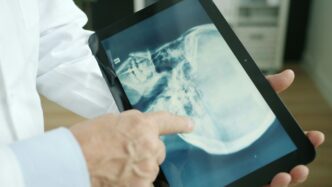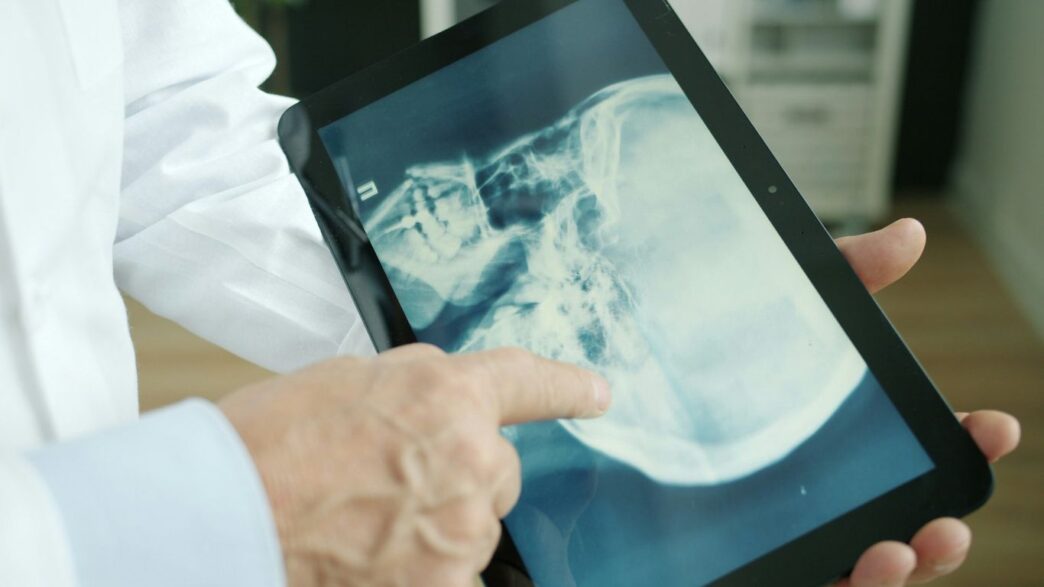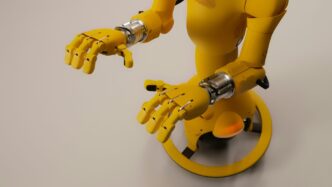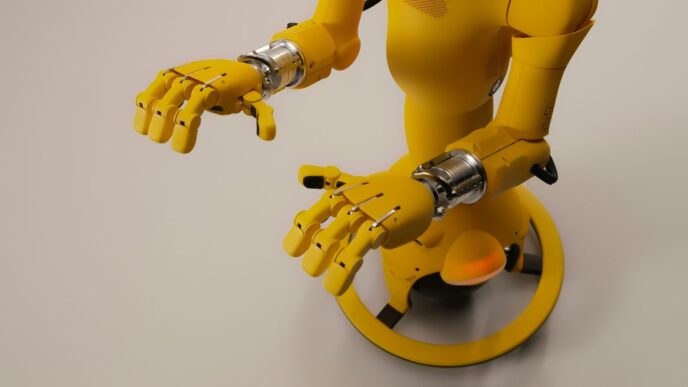Remember when checking your symptoms meant flipping through a thick medical book or waiting ages for a doctor’s appointment? Well, things have changed. Now, your phone can do a lot of that heavy lifting. We’re seeing a big shift with medical diagnosis apps that use smart technology, like AI, to help figure out what’s going on with your health. It’s not just about simple symptom checkers anymore; these tools are getting seriously advanced, helping both regular folks and doctors get a clearer picture of health faster and more accurately. This article looks at how these apps are changing the game.
Key Takeaways
- Medical diagnosis apps are moving beyond basic symptom tracking, using AI to offer more detailed health insights and early detection.
- These apps are designed to help patients better understand their health and manage it proactively.
- For healthcare professionals, these tools act as assistants, helping to speed up diagnoses and reduce mistakes.
- Key features to look for include easy symptom input, connections to wearable devices, and real-time advice systems.
- The future involves even smarter apps that can predict health issues and suggest personalized treatments.
The Evolving Landscape Of Medical Diagnosis Apps
It feels like just yesterday we were all using basic apps to track our steps or remind us to drink water. Now, things are getting seriously advanced in the world of health tech. We’re talking about apps that can actually help figure out what’s going on with your health, and not just by asking a few questions. This whole area of medical diagnosis apps is changing fast, thanks to a big push from artificial intelligence. These smart tools are moving beyond just telling you if you have a cold; they’re starting to spot more complex issues.
Understanding The Rise Of AI In Healthcare
AI isn’t some far-off sci-fi concept anymore, especially in medicine. It’s showing up in ways that are making a real difference. Think about how much data doctors have to sift through – patient histories, test results, the latest research. AI can process all of that way faster than any human. It’s like giving doctors a super-powered assistant that can spot patterns we might miss. This technology is already being used to analyze things like X-rays or skin images, helping to catch problems earlier. The growth in AI applications within healthcare is pretty significant, showing that this isn’t just a fad.
Transforming Patient Care With Smart Technology
So, how does this actually change things for us, the patients? Well, for starters, it means we might get answers quicker. Instead of waiting days for test results or a doctor’s appointment, an app could give you some initial insights right away. It also means more personalized care. By looking at your specific data, these apps can help tailor advice or even treatment plans. It’s about making healthcare more accessible and, hopefully, more effective for everyone. We’re seeing apps that can monitor heart rhythms from your phone or analyze your skin for potential issues, all from the comfort of your home.
The Growing Market For Advanced Diagnostic Tools
Because these apps are proving their worth, more and more companies are jumping into this space. The market for these advanced diagnostic tools is expanding rapidly. We’re seeing a lot of investment going into developing these technologies further. This means more competition, which usually leads to better products and more options for both patients and healthcare providers. It’s a dynamic field, with new developments happening all the time, pushing the boundaries of what a health app can do.
Empowering Patients Through Digital Health

It’s pretty amazing how much our phones can do these days, right? Beyond just scrolling through social media, they’re becoming real tools for taking charge of our health. Think about it – instead of just waiting for a doctor’s appointment when something feels off, you can get a lot of information right at your fingertips. These advanced apps are changing how we approach our well-being, making it easier to stay on top of things.
Gaining Control With Symptom Monitoring
Remember when you’d just try to remember all your symptoms to tell the doctor later? It was easy to forget things or mix them up. Now, apps let you log what you’re feeling, when you’re feeling it, and how bad it is. You can track things like headaches, stomach aches, or even just feeling generally unwell. This isn’t just about making notes; it’s about building a clear picture over time. This detailed record can be incredibly helpful when you finally talk to a healthcare professional. It gives them concrete data to work with, rather than just your memory of what happened last Tuesday.
Here’s a look at what you can typically track:
- Symptom Type: What exactly are you feeling? (e.g., cough, fever, fatigue)
- Severity: How bad is it on a scale? (e.g., mild, moderate, severe)
- Timing: When did it start? How long does it last?
- Associated Factors: Anything that makes it better or worse? (e.g., food, activity, time of day)
Accessing Timely Health Advice
Sometimes, you just need a quick answer or a nudge in the right direction. These apps can offer preliminary assessments based on the symptoms you input. They’re not meant to replace a doctor, of course, but they can help you figure out if you should be concerned or if it’s something you can manage at home. Some apps even connect you directly with healthcare providers through video calls or chat. This means you can get advice without leaving your house, which is super convenient, especially if you’re feeling under the weather or live far from a clinic. It makes getting that initial guidance much faster.
Improving Personal Health Management
Beyond just dealing with immediate issues, these digital tools help with the long game of staying healthy. They can remind you to take medications, suggest lifestyle changes based on your tracked data, or prompt you to schedule follow-up appointments. It’s like having a personal health assistant in your pocket. By keeping you engaged with your health on a daily basis, these apps encourage a more proactive approach. Instead of just reacting to problems, you start to anticipate and prevent them. This continuous engagement helps build better habits and a stronger sense of responsibility for your own well-being.
Enhancing Clinical Decision-Making
Doctors have a tough job, right? They have to sift through a lot of information, remember tons of medical facts, and then figure out what’s actually going on with a patient. It takes years to get good at it, and even then, different doctors might see things a bit differently. Plus, how tired they are or what’s going on around them can even change how they think.
This is where advanced medical apps can really step in. Think of them as a super-smart assistant for doctors. They can help gather patient information quickly and consistently, which is a big deal. This means doctors can spend less time on the initial information gathering and more time actually thinking about the diagnosis and treatment. It’s like having a really organized intern who never gets tired and remembers everything.
AI As A Co-Pilot For Healthcare Professionals
AI isn’t here to replace doctors, not by a long shot. Instead, it’s becoming a helpful partner. These apps can process patient data, like symptoms and medical history, much faster than a human can. They can then present this information in a clear, organized way, highlighting potential issues or patterns that might be easy to miss.
- Quickly summarizes patient history: Pulls together relevant details from electronic health records.
- Suggests possible diagnoses: Based on the input, it can list conditions that fit the symptoms.
- Flags potential drug interactions: Checks if new prescriptions might clash with existing medications.
- Provides links to the latest research: Offers up-to-date information relevant to the patient’s case.
Reducing Diagnostic Errors And Time
We all make mistakes, and doctors are no exception. Sometimes, fatigue or a complex case can lead to errors or slow down the diagnostic process. Advanced apps can act as a safety net. By analyzing symptoms and patient data against vast medical knowledge bases, they can help catch things that might have been overlooked. This not only improves accuracy but also speeds things up, meaning patients can get the care they need sooner.
Supporting Complex Diagnoses With Data
Some medical cases are incredibly complicated, with a mix of symptoms that don’t point to one obvious answer. This is where AI really shines. It can crunch numbers and analyze patterns from huge datasets that would be impossible for a human to process. By looking at millions of similar cases, these apps can help doctors consider rare conditions or unusual presentations of common diseases. This data-driven approach can be a game-changer for patients with difficult-to-diagnose conditions, offering a more informed path forward.
Key Features Of Advanced Medical Diagnosis Apps
So, what actually makes these advanced medical diagnosis apps tick? It’s not just about having a fancy algorithm under the hood. There are several core components that really make them useful and, frankly, indispensable for both patients and doctors. Think of them as the building blocks that allow these apps to go beyond just guessing and actually provide solid insights.
Intuitive Symptom Input and Analysis
First off, getting information into the app needs to be easy. Nobody wants to be bogged down with complicated medical terms just to describe how they’re feeling. The best apps let you input symptoms in a few different ways. You might type them out, speak them into your phone, or go through a series of questions that guide you. The goal is to make it simple for anyone to start the diagnostic process without needing a medical degree. This initial step is super important because if it’s too hard to get your symptoms in, people just won’t use the app.
Integration With Wearable Health Devices
We’re all wearing more tech these days, right? Smartwatches, fitness trackers, even smart rings are collecting a ton of health data without us even thinking about it. Advanced diagnostic apps can tap into this. By linking up with these wearables, the app can get a continuous stream of information – things like heart rate, sleep patterns, or activity levels. This constant data flow can help spot subtle changes or trends that might signal a health issue much earlier than a one-off doctor’s visit. It turns your everyday gadgets into a proactive health monitoring system.
Real-Time Clinical Decision Support Systems
This is where things get really interesting for healthcare professionals. Instead of just getting a report later, these systems work alongside doctors in real time. Imagine a doctor looking at an X-ray, and the AI is right there, highlighting potential areas of concern on the screen. It’s like having a super-informed assistant. These systems can suggest possible diagnoses, flag urgent issues, and generally speed up how quickly a doctor can figure out what’s going on. The doctor still makes the final call, of course, but the AI helps them do it faster and with fewer mistakes.
Natural Language Processing For Clinical Notes
Doctors spend a huge chunk of their day writing notes. It’s a necessary evil, but it takes time away from patients. Natural Language Processing, or NLP, is a game-changer here. It allows the app to read and understand the free-text notes that doctors write or dictate. The AI can then pull out the important bits of information and organize it in a way that’s useful for diagnosis. This means less time spent on paperwork and more time for actual patient care, plus it helps the diagnostic algorithms get a clearer picture from all that text.
Specialized Applications Of Diagnostic Technology
It’s pretty amazing how far medical apps have come. We’re not just talking about basic symptom checkers anymore. Now, there are apps designed to tackle really specific health issues, acting like digital specialists right on your phone or computer. This is a huge step forward, especially for people who might not have easy access to specialized care.
Cardiology and Heart Health Monitoring
Heart health is a big one, and apps are stepping up. Some can keep an eye on your heart rate and rhythm using your phone’s camera or a connected wearable. They can spot irregular beats, like atrial fibrillation, which is super important because it can lead to serious problems if not caught. These apps can also track your heart rate variability, giving you a look at how your body is handling stress. Think of it as a personal heart watchdog, always on duty.
Dermatology and Skin Lesion Analysis
Checking your skin for changes can be a hassle, but AI is making it easier. Apps are being developed that can analyze photos of moles or other skin spots. You take a picture, and the app uses AI to assess if it looks suspicious, like it might be melanoma. It’s not meant to replace a dermatologist, but it can be a really good first step to know if you should get something checked out sooner rather than later. This could mean catching skin cancer at its earliest, most treatable stage.
Chronic Disease Management Platforms
For folks dealing with long-term conditions like diabetes or high blood pressure, managing them day-to-day can be tough. Specialized apps are popping up to help. They can track blood sugar levels, blood pressure readings, and even medication adherence. Some platforms connect with your doctor, sending them updates automatically. This makes it simpler to stay on top of your condition and helps your doctor make better treatment choices based on your real-time data.
Mental Wellness and Early Diagnosis
Mental health is just as important as physical health, and technology is starting to play a role here too. Some apps are designed to help monitor mood patterns, sleep quality, and even speech patterns, which can be early indicators of conditions like depression or anxiety. While these apps can’t diagnose a mental health condition on their own, they can provide valuable data to share with a therapist or doctor, potentially leading to earlier intervention and support.
The Future Of AI In Medical Diagnostics
So, what’s next for AI in figuring out what’s wrong with us? It’s pretty exciting, honestly. We’re moving beyond just looking at one thing at a time. Think about AI that can look at your X-rays, your lab results, and your medical history all at once. It’s like giving doctors a 360-degree view, so they don’t miss anything.
Personalized Treatment Pathways
This is where things get really interesting. As we get better at understanding our own DNA, AI will be able to use that information. Imagine getting a treatment plan that’s not just based on your symptoms, but on your unique genetic makeup. It’s like having a tailor-made approach to your health, which could make treatments work a lot better.
Predictive Analytics For Proactive Care
Instead of waiting for you to get sick, AI will start predicting problems before they even happen. Your smartwatch or other health gadgets will feed data into these systems constantly. The AI can then spot tiny changes that might mean something’s up, like a heart issue or trouble breathing at night, long before you’d even think to see a doctor. This means we can catch things early and deal with them before they become big problems.
The Role Of Generative AI In Healthcare
Generative AI is a big deal. It’s not just about making text or pictures; it’s about creating new insights. These advanced AIs can process all sorts of medical information – images, reports, patient notes – and put it all together. This helps doctors make more informed decisions, faster. It’s like having a super-smart assistant that can sift through mountains of data to find what’s important. We’re also seeing AI that can explain why it thinks something is going on, which really builds trust with both doctors and patients. Plus, with more and more data being generated, AI will be key in managing it all securely, using techniques that keep patient information private while still allowing the AI to learn and improve. It’s a complex puzzle, but the pieces are fitting together to create a healthier future.
The Future is Now: Smarter Health in Your Pocket
So, we’ve seen how these new medical apps are way more than just fancy symptom checkers. They’re actually starting to help doctors figure things out faster and more accurately, and they’re giving us regular folks a better handle on our own health. It’s pretty wild to think about how much this tech is changing things, and it’s only going to get more common. We’re talking about a future where your phone could be a key part of keeping you healthy, catching problems early, and making sure you get the right care when you need it. It’s not quite science fiction anymore; it’s just… health, but smarter.












